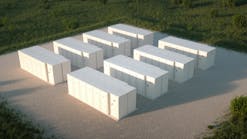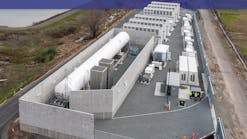US. DOE Announces Funds Worth $325 million For 15 Long-Duration Energy Storage Projects
The U.S. Department of Energy (DOE) has announced grants worth about $325 million for 15 projects across 17 states and one tribal nation to accelerate the development of long-duration energy storage (LDES) technologies.
The demonstration projects, funded by the Bipartisan Infrastructure Law and part of President Biden’s Investing in America agenda, will increase community control of local power systems, mitigate risks associated with disruptions to the grid and help communities develop reliable and affordable energy systems.
The grant supports DOE’s aim to reduce the cost of LDES by 90% by 2030 and the Biden-Harris Administration’s efforts to advance critical clean energy technologies, expand the adoption of renewable energy resources and strengthen America’s energy security.
“As we build our clean energy future, reliable energy storage systems will play a key role in protecting communities by providing dependable sources of electricity when and where it’s needed most, particularly in the aftermath of extreme weather events or natural disasters,” said U.S Secretary of Energy Jennifer M. Granholm.
According to DOE’s Pathways to Commercial Liftoff: LDES report, cheaper, longer and more efficient storage is required to meet the fluctuating energy demand.
The LDES Demonstrations Program, managed by DOE’s Office of Clean Energy Demonstrations (OCED), funds a range of different technology types to overcome technical and institutional barriers to full-scale deployment of LDES systems in diverse geographies and climates.
The selected projects will feature a range of intraday (10 to 36 hours) and multiday (36 to 160+ hours) storage solutions to reduce the frequency and length of power interruptions due to severe weather or cyberattacks on the grid.
Few of the selected projects will adopt innovative approaches for re-using and recycling retired batteries, thereby supporting the domestic electric vehicle industry and creating new economic opportunities with environmental benefits to communities across the country.
The Communities Accessing Resilient Energy Storage (CARES) (Red Lake Nation, Santa Fe, NM, and Petaluma, CA) Project led by Rejoule targets to use retired EV batteries to provide demand reduction, load shifting and resilience to two affordable housing complexes and a Red Lake Nation workforce development campus.
Rejoule also plans to collaborate with other stakeholders to expand workforce opportunities in the clean energy sector.
The Second life Smart Systems (SMART) (Atlanta, GA, San Diego, CA, Orangeburg, SC, Denmark, SC, and New Orleans, LA) Project led by Smartville seeks to take advantage of retired electric vehicle lithium-ion batteries to build stationary storage systems to bring grid resiliency, increase energy affordability and supply backup-up power to senior centers, low-income multi-family affordable housing complexes and EV charging facilities.
The project will also include career employment training at several Historically Black College and Universities.
The Multiday Iron Air Demonstration (MIND) (Becker, MN and Pueblo, CO) project led Xcel Energy, in partnership with Form Energy, seeks to fasten the commercialization and market development of multiday storage by deploying two 10 MW 100-hour LDES systems at retiring coal plants in Minnesota and Colorado.
The project team plans to develop pathways to employment for communities near the LDES sites and other workforce development initiatives through collaborations with stakeholders, including labor unions such as the International Brotherhood of Electrical Workers.
The Children's Hospital Resilient Grid with Energy Storage (CHARGES) (Madera, CA) Project led by the State of California through the California Energy Commission aims to provide critical power backup for an acute care hospital and will provide resiliency in a region at-risk for significant power outages due to fires, storm surges, floods, extreme heat, and earthquakes.
The project team will install a 34.4 MWh battery system for the Valley Children’s Hospital, located in an underserved community, with Faraday Microgrids.
Recently, DOE also launched the Collaborative Alignment for Critical Technology Industries lab call to establish an LDES industry working group to bring together stakeholders across the value chain, facilitate discussion around divergent practices, identify commercialization challenges and work collaboratively to develop recommendations and best practices for resolving challenges.
DOE announced six projects selected for the LDES Lab Call to demonstrate technology innovations and resiliency advantages in national labs at a range of scales.


